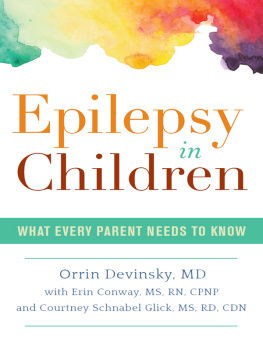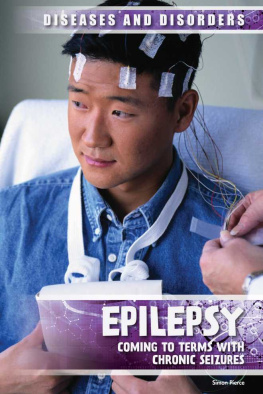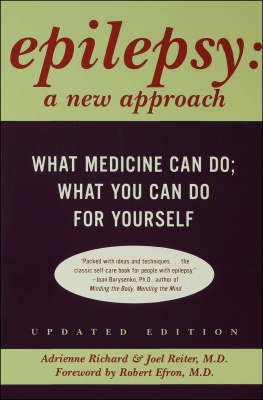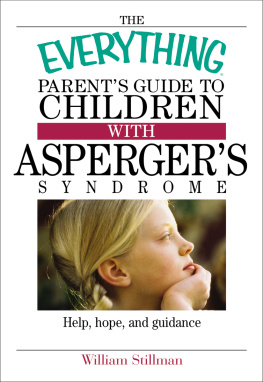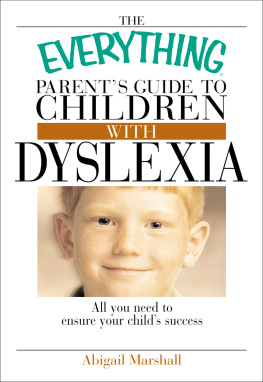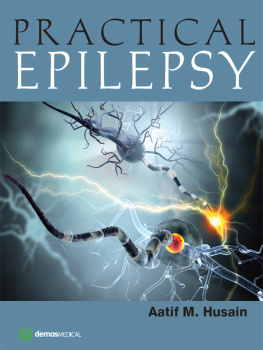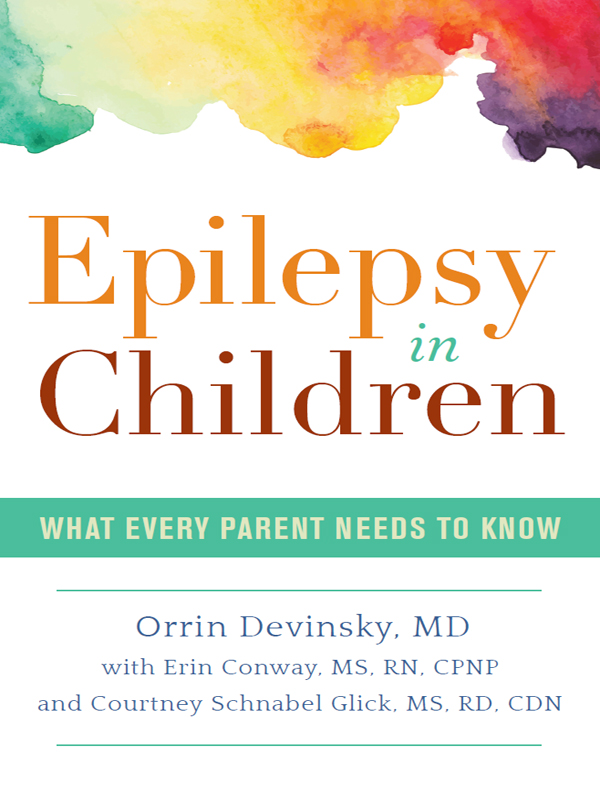Epilepsy in Children
What Every Parent Needs to Know
Orrin Devinsky, MD
with Erin Conway, MS, RN, CPNP and Courtney
Schnabel Glick, MS, RD, CDN

Visit our website at www.demoshealth.com
ISBN: 978-1-936303-78-6
e-book ISBN: 978-1-617052-36-1
Acquisitions Editor: Julia Pastore
Compositor: diacriTech
2016 by Orrin Devinsky, Erin Conway, and Courtney Schnabel Glick. All rights reserved. This book is protected by copyright. No part of it may be reproduced, stored in a retrieval system, or transmitted in any form or by any means, electronic, mechanical, photocopying, recording, or otherwise, without the prior written permission of the publisher.
Medical information provided by Demos Health, in the absence of a visit with a health care professional, must be considered as an educational service only. This book is not designed to replace a physicians independent judgment about the appropriateness or risks of a procedure or therapy for a given patient. Our purpose is to provide you with information that will help you make your own health care decisions.
The information and opinions provided here are believed to be accurate and sound, based on the best judgment available to the authors, editors, and publisher, but readers who fail to consult appropriate health authorities assume the risk of injuries. The publisher is not responsible for errors or omissions. The editors and publisher welcome any reader to report to the publisher any discrepancies or inaccuracies noticed.
Library of Congress Cataloging-in-Publication Data
Devinsky, Orrin, author. | Conway, Erin, author. | Glick, Courtney Schnabel, author.
Epilepsy in children : what every parent needs to know / Orrin Devinsky, with Erin Conway, and Courtney Schnabel Glick.
New York, NY : Demos Medical Publishing, LLC, [2016] | Includes bibliographical references and index.
LCCN 2015038436 | ISBN 9781936303786
LCSH: Epilepsy in childrenDiagnosis. | Epilepsy in childrenTreatment. | Epilepsy in childrenDiet therapy.
LCC RJ496.E6 D48 2016 | DDC 618.92/853dc23 LC record available at http://lccn.loc.gov/2015038436
Special discounts on bulk quantities of Demos Health books are available to corporations, professional associations, pharmaceutical companies, health care organizations, and other qualifying groups. For details, please contact:
Special Sales Department
Demos Medical Publishing, LLC
11 West 42nd Street, 15th Floor
New York, NY 10036
Phone: 800-532-8663 or 212-683-0072
Fax: 212-941-7842
E-mail:
Printed in the United States of America by McNaughton & Gunn.
15 16 17 18 19 / 5 4 3 2 1
To all of the parents and our patients
who have taught us so much about epilepsy
and even more about caring
CONTENTS
Guide
CONTENTS
The three of us came to health care from very different backgrounds and perspectivesnursing, medicine, and nutrition. Our paths crossed over the care of children with seizures. We have been fortunate to share their lives and learn from them, as well as from their parents and caregivers. This book is inspired by all of our patients and their families. Their questions, experiences, and hope for their childs future are reflected in these pages.
Great questions unfortunately outpace good answers. From diagnosis and treatment options to where the limits of our current knowledge extend, this book will hopefully help parents navigate what at times can be an overwhelming period in their childs life. There has been exponential growth in scientific data, lay Internet sites and community chat rooms, YouTube seizure videos, and disease organizations for which epilepsy is a common thread. The amount of information and connections can be endless and confusing. Our goal is to help parents by providing a home base in the pages of this book to better understand seizures and epilepsy.
We hope to simplify the information while keeping the depth and extent of coverage sufficient to make it comprehensible, approachable, and informative. There is a wide range of the epilepsies in childhood. Seizure types in infants can differ greatly from those in toddlers. Parents should understand their childs epilepsy, but understanding it in the context of the spectrum of epilepsy and associated disorders can better place their childs disorder in perspective.
There is no single face of pediatric epilepsy. Many children with epilepsy enjoy extremely successful academic, social, and athletic lives. Others face challengesranging from mild attention and learning disorders to severe limitations in communication, psychiatric disorders, and physical limitations. This diversity presented our greatest challenge. There is a desire to paint the world through rose-colored glasses so as to help overshadow, at least in part, the stigma that has long cast a dark shadow on these children. Parents have the greatest power to disarm stigma through understanding and comfort. They must first come to accept epilepsywhat it means and doesnt mean. It is important to see through the epilepsy and other disabilities and see their children for who they are. The truth is more simple and enduring. We strove to follow our own advice.
Parents have assumed a new role in health care. They have transitioned from passive passengers on a journey led by the health care team into active participants. Indeed, parents have fueled much of the innovation in epilepsy research, access to information, advocacy, and how health care is delivered. Parents not only challenge us to do more, they help us provide more sensitive care, think of more ambitious research questions, collaborate in novel ways, and to join forces as partners. We hope this book empowers more parents to challenge and encourage all health care providers to work together in the fight against epilepsy.
All ventures are collaborations, and this one extends far beyond the three authors. We hope to have accurately and accessibly conveyed a snapshot of our medical knowledge and quality-of-life issues for children with epilepsy. While these pages largely reflect our perspective, we knew that our view was too constrained and occasionally flawed. We leaned on our colleagues and our patients parents to keep us honest. They reminded us when our views were contradicted by facts and when our answers failed to capture the nuances or diversity of reality. We cannot thank them enough: Peter Camfield, Karina Fischer, Jacqueline French, Mike Jasulavic, Warren Lammert, Eric Marsh, Kate Pico, Angela Stone, and Maggie Varadhan.
We are also deeply indebted to Leigh Ann Hirschberg and Julia Pastore, who provided invaluable editorial input to this effort.
Share
Epilepsy in Children: What Every Parent Needs to Know




